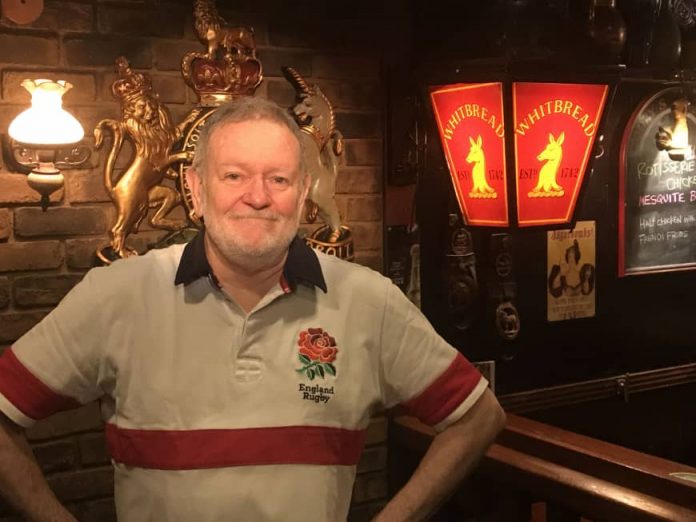British pubs are everywhere in Japan these days. They, along with their Irish counterparts, are common drinking venues for both expats and Japanese eager for a cozy, dimly lit atmosphere, hearty pub fare such as shepherd’s pie, fish and chips, and a tempting variety of draft beers.
Pubs are now so numerous in Japan that it’s interesting to reflect upon the time when they weren’t. John Watkins, founder and owner of The Tavern, has been in the business since the English pub in Japan was an exotic rarity.
A native of Bristol, where he studied photography, Watkins eventually made his way to London before being hired at 22 as a photographer on passenger ships.
“I did that for about five years in the late 1970s and early ’80s, traveling all over the world,” he recalls. “It was a lot of fun. I couldn’t imagine giving it up at the time.”
It was through his cruise ship job that Watkins was introduced to Japan. Regularly pulling into Kobe and Yokohama and taking on Japanese passengers, Watkins noted that no one among the ship’s crew spoke Japanese. Thinking it would be interesting and advantageous to learn, he took a six-month leave of absence from his job to study at a language school in Tokyo. He also had an active social life and enjoyed going out drinking; yet he felt there was something missing.
“It was the 1980s. There were no British-owned pubs in Yokohama and only one in Tokyo — The Rising Sun, in Yotsuya, which had been there since the early 1970s and is still there,” he says. “I befriended the owner, Jerry Hegarty (who has since passed away, sadly). I loved draft beer, then as now, and the only options besides The Rising Sun were basically izakaya (Japanese-style taverns), which were nice except the choices consisted of one lager. Still, Japan was growing on me. I was having a great time and making friends, so I thought, ‘Well, maybe I’ll stay another six months.’
“By this time I was also teaching English, getting dispatched to give lessons at companies. I was one of the more popular teachers because I made the students laugh and put them at ease. Anyway, I saw how Jerry at The Rising Sun had a good rapport with customers, saw that I had a similar thing going in the English lessons, and thought, ‘If Jerry can do it, I can do it!’”
Thus Watkins made his decision: He would settle down in Japan and open Yokohama’s first English pub.
“Considering the long history of Anglo-Japanese relations, especially in Yokohama, I was amazed no one had opened a pub here before,” he says.
A new approach to draft beer
With no pub experience except a part-time stint during his student days, Watkins opened the first Tavern in Yokohama’s Chinatown in 1985.
“It was an immediate success,” he says. “Chinatown at the time was Yokohama’s major nightlife district, and this was during the bubble economy. It got very busy, very quickly. So in 1989 I opened a second pub, near the west exit of Yokohama Station.” (The Chinatown Tavern closed in 2004.)
Establishing and maintaining a high quality of food, drink and service were essential to Watkins’ vision for his business. Beyond this, he also wanted to create an authentically British pub.
“For the Yokohama Tavern, I imported a lot of stuff for the interior: the furniture, the fireplace and so on,” he says. “I wanted to make it as authentic as possible — you open the door and you’re in England, in a late Victorian Era pub. Even now, people come in and say, ‘Wow, we’re not in Japan anymore!’ Customers also tell me it’s relaxing here, a place where they can unwind. That makes me very happy.”
Despite the initial and lasting success, however, there were challenges to overcome.
“It was very difficult to buy a draft pint of British beer anywhere in Japan,” Watkins says. “There were cans of some European varieties and the usual mass-marketed American beers. Also, bars serving draft beer normally had a big stainless steel dispenser on the counter, with one tap. The beer would be one choice: one of the four major brands of Japanese lager. Everything else was bottled beer.
“So I said to my supplier that I wanted draft beer, and he asked, ‘When shall I come back to take the dispenser away?’ I said, ‘What do you mean?’ He explained that most places served draft beer only in the summer, so the machine would be installed from June to September. He was surprised to hear I wanted to serve draft beer permanently, but of course he agreed, and then I had this big machine sitting on the bar, looking terrible.
“I then arranged with a local engineering firm to modify the dispenser with new fittings and a hose, so I could place it under the bar, and imported a tap from England.
“Some time later, representatives from the beer company came in and were surprised; at first they thought I had no draft beer because there was no machine visible on the counter. When they realized what I had done, they came behind the bar and took pictures of the way I had set it up. So I guess that might have been the start of having the dispenser under the counter in Japan, though I’m sure it would have happened sooner or later anyway, as more foreign brands of beer came in. The availability of draft beers in Japan now is incredible compared to about 30 years ago.”
Localizing the Victorian
While the Tavern’s decor and ambience are English, the customer service is fully geared to Japanese expectations, including a focus on efficiency and having service at the tables. Watkins also notes the wide variety of cocktails on the menu compared to what one would typically find at a pub in Britain. His wife, Nozomi, helps run the pub and keeps a keen eye on current drinking trends to adapt to their menu, such as the vogue in Korean makkori several years ago and the whiskey highball’s recent surge in popularity.
As might be expected, one concession to modern technology in this otherwise Victorian atmosphere is a big screen TV to watch sporting events.
“We show a lot of soccer and rugby, but rugby gets the priority. (Because I love rugby!) We’ll definitely be showing the games during this year’s Rugby World Cup,” he says.
Watkins has strongly held views on maintaining beer quality, stating it’s something that you can’t compromise on.
“For example, draft beer goes through a pipe. If you don’t keep those pipes clean, the beer’s not going to taste good,” he says. “Also, here’s a rule of thumb for assessing a bar: Do they pour off the first pint of the day? They should. Otherwise you’re getting a pint that’s been sitting in the pipe all night instead of in the keg. Even if the pipes are kept properly clean, it’s not going to taste good. That’s why here we always throw away the first pint.”
Watkins maintains a passion for his job.
“The quality of the food and drink, the lighting, the volume of the music, it all has to be perfect. I don’t want a complaint, ever. So it may not look like it, but it’s hard work,” he says, adding that the hard work is worth it, as he gets to meet so many different people.
“You never know who’s going to walk in the door,” he says. “It could be a new customer, or a regular, or someone you haven’t seen for years. And it’s wonderful to hear people thank me for having founded this pub. Sometimes, after a long day, after closing when I’m here on my own, I take a little break to catch my breath. I look around and still, after 30 years, think about how much I love this place.”
For more information about The Tavern, visit www.the-tavern.com.











































